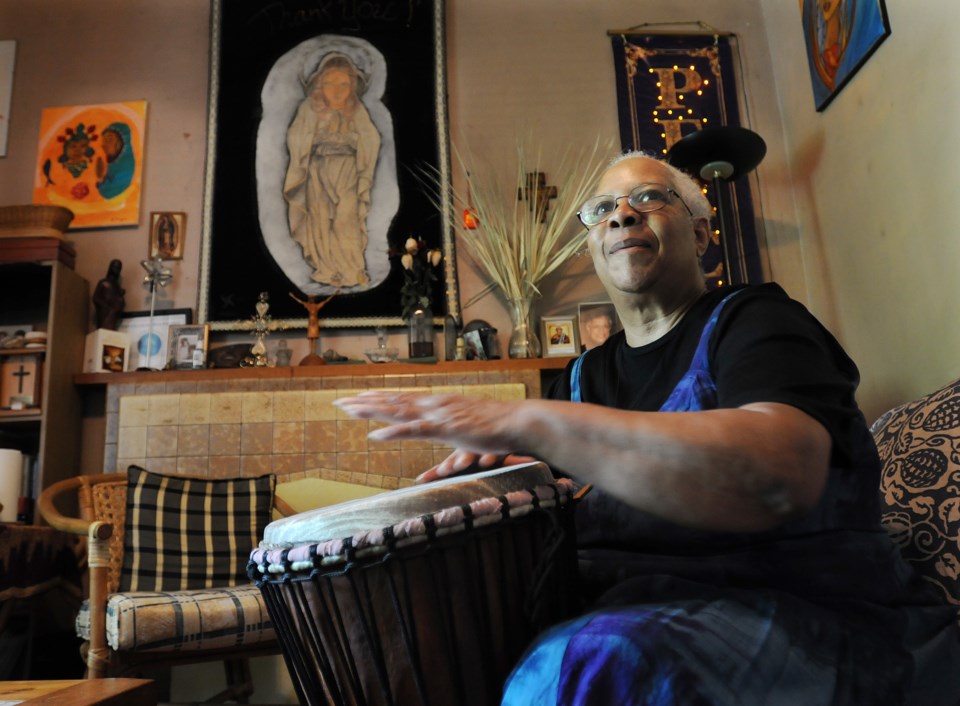The moment she was ordained as a priest, the Rev. Dr. Victoria Marie was excommunicated from her church.
Vikki, as she prefers to be called, was a Franciscan sister with 15 years of service as a nun, including many working in the Downtown Eastside.
She was called to the order somewhat late in life, having fallen away from the Roman Catholic Church for several decades. The break resulted from a single, pivotal discussion near the end of 12 years of Catholic elementary and high school in her native Brooklyn, New York.
“In my senior year of high school,” Marie says, “they called all of us black girls, all 12 of us in the school of 400, and gave us a lecture on how it was better for us to marry a black Protestant than a white Catholic.”
“That kind of did it for me,” she says, sitting in the cozily cluttered “Samaritan House,” the shared East Vancouver home that doubles as HQ for the Vancouver Catholic Worker movement. “It said to me that, for them, race was more important than God.”
The next few years saw her work for a time in New York, until a friend told her a bit about Montreal, and she moved to Canada in 1965. Asked what happened in Montreal, Marie heartily laughs.
“The ’60s!”
She worked temp jobs as a keypuncher and waitress. Her separation from the Roman Catholic Church seemed complete at the time, even though she acknowledges the irony that she left just as the church, via the Second Vatican Council, was undergoing its most extraordinary liberalization ever.
Life continued. In 1979, she moved to Vancouver and a decade later felt moved to become a member of St. Paul’s Catholic Parish on East Cordova, in the Downtown Eastside.
“I met a really great group of nuns and they helped me play catch-up from 1963 to 1990,” she says, adding: “At that time, I also sobered up.”
She started her bachelor’s degree at SFU at the age of 42. She then received a Master’s in anthropology from SFU and another Master’s in pastoral studies from the Vancouver School of Theology (VST), which she later upgraded to a Master’s of Divinity. Then she received a doctorate from UBC in educational studies. Her thesis was on the role of spirituality in recovery from addiction.
In 1997, she became a nun.
The Catholic Church, to clarify, does not ordain woman. While she was studying at VST, a school associated with the Anglican and United churches, both of which do ordain women, many of her fellow graduates were aiming for the clergy.
She toyed with the idea of converting to Anglicanism in order to fulfill her ambition for service. Her decision not to was simple.
“Because I’m Catholic,” she declares plainly. She continued her work as a nun and, along the way encountered an organization called Roman Catholic Womenpriests. While she had ambitions toward ordination, she was not initially moved to join the schismatic group of excommunicated female priests.
“I didn’t want to be in it for it political statement or to be a protester,” she says. Her views changed when a “womanpriest” visited Vancouver and gave a service, which was attended by many members of Dignity, a group for LGBT Catholics and their allies.
“To hear the sadness in the voices, that they didn’t have a home church to go to that was Catholic, that really tugged on me,” Marie says. “So I made the decision because, when I first became a nun, it was to serve. I saw this as a further call to serve.”
She left her Franciscan order, an act she equates with divorce, and was ordained as a womanpriest in 2012.
She is now pastor of Our Lady of Guadalupe Tonantzin Inclusive Catholic Community, which holds mass at the Listening Post at Main and Hastings. For mainstream Catholics, the mass will be familiar, although the language is more inclusive. The hymns are the same. But the congregation is a little different than most Roman Catholic churches.
“Our community is some practicing Catholics, some fallen away Catholics because of church teaching on homosexuality, some divorced and remarried Catholics, and also some people from other denominations who really have an appreciation of liturgy and also of the small community where people actually know each other face-to-face,” she says.
She doesn’t expect to see the Vatican approve the ordination of women in her lifetime — and even if it did, she wouldn’t be satisfied.
“We would have to then be part of that structure and the way it functions right now,” she says. “And I think right now the church functions like a very, very dysfunctional family … It’s more like a monarchy than a community of believers.”
In contrast with what she sees as a Vatican monarchy, the analogy she chooses to describe her own movement is succinct.
“We’re kind of like the lifeboat of the people that the church has thrown overboard,” she says.



